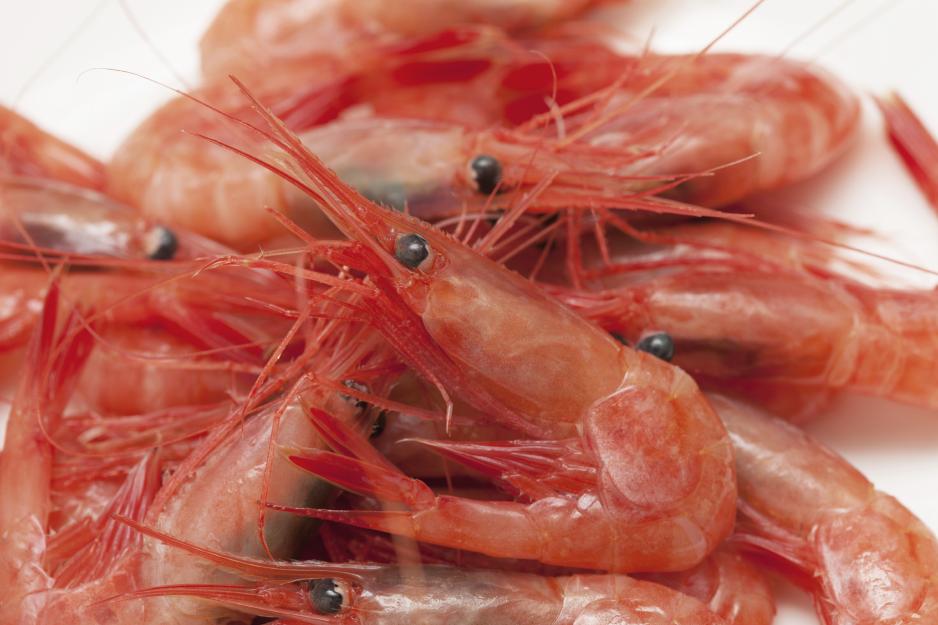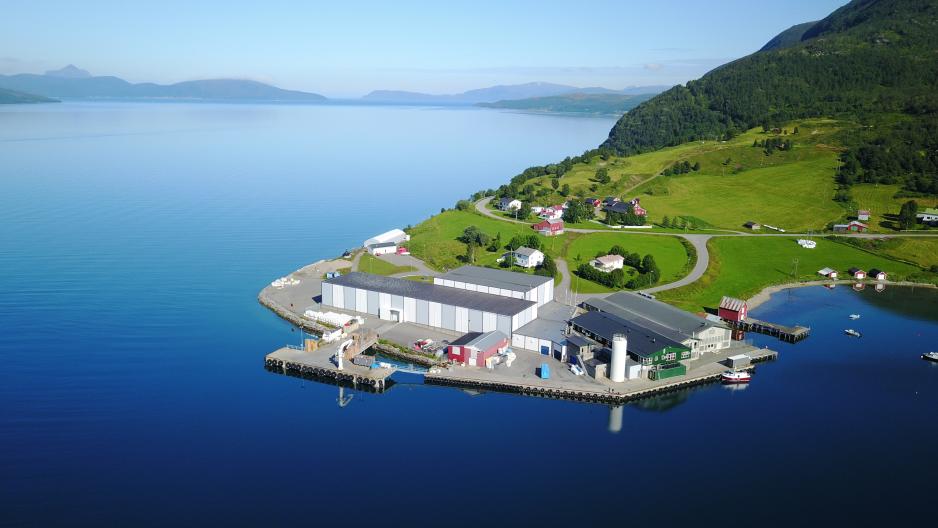Invests Heavily in Canadian Market With Health Food Based On Shrimp Waste, but struggles to enter the European market

Andreas Semmingsen with Asbjørn Gilberg. Gilberg is the scientist behind the research report demonstrating that peptides from shrimp shells may have a strong effect in lowering blood pressure, which in its turn was the background for the establishing of Marealis AS.
Canadians will be the first to try a health product made of shrimp shells from the Arctic for regulating their blood pressure. However - the product does not get into the European market
Stella Polaris, a company located in Lenvik in Troms county in Northern Norway, is one of the world’s largest exporters of peeled cold water shrimps. However, only 40 percent of the shrimp is actually eaten. The remaining 60 percent, i.e. the head, the shell and the process liquids, constitutes 6,000 tons of waste ever year, getting rid of which has a cost, both in terms of money as well as from an environmental point of view.
But perhaps one could use this waste for a purpose? That was a question the company posed back in 2007.
- A research report was presented in 2007 proving that the peptides of the shrimp shells is very potent and has a strong effect on the regulation of blood pressure, explains Andreas Semmingsen, General Manager of Marealis AS, a subsidiary of Stella Polaris. Peptides are small pieces of proteins, amino acids bound together to constitute a chain.
The company conducted a market survey that revealed that high blood pressure is an increasing problem in the population. It is also the largest direct cause of death in the world overall.
- According to Norwegian broadcaster TV2, there were 870,000 users of blood pressure regulating medicine in Norway in 2017. Those medicines cost NOK 1 billion (approximately 100 mill Euro).
- We then went to the boards of Stella Polaris and Innovation Norway and said “Give us two million kroner and two years, and we will have a product on the market”, he says.
- Two million Norwegian kroner is approximately 200.000 Euro

Stella Polaris exports shrimps on a large-scale basis. Now, its waste will also be put to use – as a means to lowering high blood pressure.
Give us two million and two years, and we will have a product on the market
The following year, Marealis AS was founded. And in subsequent years, with assistance from Nofima and UiT Norway’s Arctic University, they managed to find a method with which to mix the shrimp shells with water and enzymes that cut the proteins in just the right way to get the desired effect. Two clinical studies later have demonstrated that the product, named PreCardix, has a significant and strong effect on regulating blood pressure.
Do everything themselves
So far, so good. However, to enter the world market of new health products is a long and winding process.
- We had envisioned initially that we were to be a pure ingredient supplier and find a professional brand owner that could take care of the rest. However, we chose to take a completely different route, mainly for two reasons, Semmingsen explains and expands:
- Firstly, because of the value chain. With this business model, Marealis, which has invested millions in research and development, would only be left with 10-15 percent of the gains. Secondly, our studies show an effect when the daily dose taken is 1,200 mg. We therefore wanted to ensure that the product was to be sold with this dosage. Others refer to external documentation and water out the product so that consumers often do not take in a sufficient amount of the active substance to gain the optimal health effect. We were not interested in that and thus decided to do it all ourselves.
It was to be come a long and educative process:
- However, one that felt better in every way.

Marealis are not allowed to tell potential buyers in Norway and Europe that PreCardix may help lowering high blood pressure
Long process for approval
The work to get approval in the USA and Canada started in 2014. New drugs can have two approvals, one that says that the product is safe and thus permitted to sell, and another that labels it as having a health benefit, which in the case of PreCardix would be regulating blood pressure.
- We received both approvals in Canada in 2017, and in the US too. However, Europe is more complicated, he says.
Marealis started the process in Europe with Finland, which is considered one of the strictest countries when it comes to approving new health products.
Managing to get an open door in Finland opens the door to the other 27 EU countries. Finland gave the thumb’s up to PreCardix. However, the regulations are constructed so that all 27 EU countries must agree to approve of the product in order for it to be legal to sell and market.
- Spain and the Netherlands said no. They argued that the effect was “too good”, Semmingsen says.
Fortunately for Marelis, changes were made in the EU regulations and a new body for approving such products was introduced. The new body, the European Food Safety Authority (EFSA), gave PreCardix a “new food” approval, which is the equivalent of the “safe” approval in Canada and the USA.
The process to get a health claim approved by EFSA is, however, far more demanding than in the USA and Canada. Thus, Marealis cannot communicate to consumers what the health product actually is helpful for. Nor does the EEC approval received last year give permission to market it as a product helping against high blood pressure.
- That is a shame, absolutely. We would have loved to get access to Europe too. We see how many we could have helped, people who are on blood pressure medicines – which often come with side effects, that would benefit from PreCardix, but who do not get to do just that. There is also a large number of people who do not yet need medicine, however, who should nevertheless to something to reduce and stabilize their blood pressure.
That is a shame, absolutely. We would have loved to get access to Europe too

Scientists have now found out that shrimp shells may have blood pressure lowering effect. That opens up vast new possibilities for one of the world’s largest shrimp exporters.
Semmingsen divides the population into three groups: The healthy ones, the ones whose blood pressure required medicine, and those with a slightly elevated blood pressure.
- The latter group is the prime target for our product. A brand new health product that is so near to being medicine as possible, given documentation and the research behind hit.
– This is both an advantage as well as a disadvantage, as we have to carve our own way into the market.
Focusing on Canada
Due to the problems getting the relevant approvals in Europe, Marealis is now focusing on the Canadian market, and later also the US.
It is a vast market: An estimated 200 million people in North America have elevated blood pressure.
- We are producing the peptide power on the national pilot facility for test processing biological raw materials, Biotep outside Tromsø (Norway), and ship it to Canada, where it is packed into a readymade product and distributed. That is well underway, even though we did not quite get the sales process going until near the end of last year.
In 2007, they thought the process of getting PreCardix to the market would take two years and cost two millions. It was to take 11 years and cost nearly 50 millions (NOK). (approximately 5 million Euro)
- 30 millions (approximately 3 mill Euro) of this comes from investors, while NOK 20 millions (approximately 2 mill. Euro) are public support funding.
We are humble and know that it will take time, in particular because we are a small company
Despite it taking time and hard, long-term work to succeed in the market, Semmingsen has no doubt that the product will go far.
- However, we are humble and know that it will take time, in particular because we are a small company with three employees and have our limitations when it comes to resources and capital, he says, and in closing:
- The potential is there: If we presume that Stella Polaris uses all its shrimp waste to blood pressure products, i.e. 6,000 tons, that could become 180 tons of the active ingredient in our product, constituting five million user doses. In terms of turnover, the value would be NOK 1.5 billion. It sounds like a lot, however, it would nevertheless only cover 0.3 percent of the market in North America alone. However, we are nowhere near that yet.
He reveals that the goal is to build a production facility for health promoting powder in Kårvikhamn, Troms County, where he grew up running around the quays.
The Norwegian Food Safety Authority writes in an email to High North News that only health claims approved by the EU Commission can be used to market health products in Norway. And only claims that are sufficiently scientifically documented will be approved.
May take a long time
The time required to receive approval from the EU may be long, however, once a claim has been approved by the EU, that approval will also be valid in Norway.
The EU Commission has created a registry where it is possible to search for approved and rejected health claims.
All businesses have the opportunity to apply for approval of a new health claim. Only claims that are sufficiently scientifically documented and that can be understood by the average consumer may be approved. When a company applies for approval of a new claim, the application is forwarded to a member country’s authorities (EFSA) for evaluation. The application has to meet certain requirements and criteria, so that EFSA can evaluate whether or not the claim is sufficiently scientifically documented. In Norway, such applications are forwarded to the Food Safety Authority, which subsequently assesses the application and forwards it to EFSA.
Marealis has not yet applied for such approval from EFSA, as it does not at present hold sufficient scientific evidence.
- Translated to English by Elisabeth Bergquist

Kårvikneset in Troms county, where the company Stella Polaris AS produces thousands if tons peeled shrimps every year.

